Samantha Combs's Blog, page 5
September 29, 2013
The Writer's Alphabet - H
H is for HEA. Or, HFN, depending on your story arc and if your work is part of a series. LOL, don't freak out. I can explain it all.
 HEA is short for Happily Ever After. If you write for some publishers, such as Harlequin, Avon Romance, or Harper Collins, the HEA is a compulsory component. If your character doesn't get the girl or man of his or her dreams, you either cannot publish with them or you need to rewrite the ending.
HEA is short for Happily Ever After. If you write for some publishers, such as Harlequin, Avon Romance, or Harper Collins, the HEA is a compulsory component. If your character doesn't get the girl or man of his or her dreams, you either cannot publish with them or you need to rewrite the ending.
HEA is a staple of your writing diet if you are a romance author, a historical fiction writer, or a writer of any genre where the romance is the compelling factor. Now, I write several different genres and in all of them, romance has a part. But, the compelling part of my stories is not necessarily the lovey-dovey. In my paranormals, the magic is the kicker. The horrors, well, the horror is the best part. But, there is always a little romance in there. In most cases, my character's unexplainable and sometimes annoying desire for someone is the one thing that makes them human, that fleshes out their stories and brings them to life for the reader. Longing, desire, coveting...these are all uniquely human traits. Animals don't do that. We do.
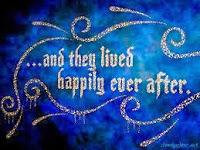
So, what then, is HFN. Easy. Happy for Now. This is great for a series where you plan to maybe kill off the character, or have your heroine land in the arms of the decidedly roguish man and not the steadfast one who seemed so perfect for her in the beginning. But, will he remain faithful? Ah, that is the question for an HFN novel.
As a horror writer, I prefer a little-known acronym: HNE. Happily never after. *giggles evilly*
 HEA is short for Happily Ever After. If you write for some publishers, such as Harlequin, Avon Romance, or Harper Collins, the HEA is a compulsory component. If your character doesn't get the girl or man of his or her dreams, you either cannot publish with them or you need to rewrite the ending.
HEA is short for Happily Ever After. If you write for some publishers, such as Harlequin, Avon Romance, or Harper Collins, the HEA is a compulsory component. If your character doesn't get the girl or man of his or her dreams, you either cannot publish with them or you need to rewrite the ending. HEA is a staple of your writing diet if you are a romance author, a historical fiction writer, or a writer of any genre where the romance is the compelling factor. Now, I write several different genres and in all of them, romance has a part. But, the compelling part of my stories is not necessarily the lovey-dovey. In my paranormals, the magic is the kicker. The horrors, well, the horror is the best part. But, there is always a little romance in there. In most cases, my character's unexplainable and sometimes annoying desire for someone is the one thing that makes them human, that fleshes out their stories and brings them to life for the reader. Longing, desire, coveting...these are all uniquely human traits. Animals don't do that. We do.

So, what then, is HFN. Easy. Happy for Now. This is great for a series where you plan to maybe kill off the character, or have your heroine land in the arms of the decidedly roguish man and not the steadfast one who seemed so perfect for her in the beginning. But, will he remain faithful? Ah, that is the question for an HFN novel.
As a horror writer, I prefer a little-known acronym: HNE. Happily never after. *giggles evilly*
Published on September 29, 2013 05:00
September 27, 2013
The Writer's Alphabet - G
G is for genre. Genre is not so much what your book is, but more about who is the audience. When you write a story, you need to be aware who you are writing for. Oh, I know it's apropos to say of course, we are writing for ourselves, but that/s not entirely true, is it? No. We write for one real reason: to entertain the reader. And to do that, we have to target who the reader is.

Knowing your audience dictates everything about your work. The genre defines the demographic of your targeted reader. For instance, because I write in different genres, I have had to adapt different voices. When I am writing Young Adult, my voice has to be genuine, or I will be called out as a fraud. The genre dictates that my work be realistic, a bit angsty, and interesting enough to hold a shorter attention span. When I write adult horror, the genre defines my characters as less introverted, shallow in some instances as adults can tend to be, and less restricted, as Young Adult tends to require. Are you seeing it now?
As a writer, you also need to be able to define your genre readily. Agents and editors or publishers will have no interest in your work if you are unable to identify your audience. But what about genres that overlap, I can hear you asking. Same rule applies. You must be able to nestle it securely in one of the named genres. Sometimes nothing seems to fit perfectly. You are sure you have just invented the newest genre: Time-traveling historical figures with a dash of paranormal romance! Um, not so much.
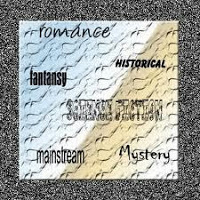
Determining your genre is actually easier than it sounds. Answer one question: What is the driving force of your work? Is it the romance, or the paranormal element? Which one can exist without the other? Most would agree Twilight is very much a romance, right? But, what makes it INTERESTING? The paranormal element. A-HA!
Once you can define your genre, you are well on your way to submitting your work for publication.

Knowing your audience dictates everything about your work. The genre defines the demographic of your targeted reader. For instance, because I write in different genres, I have had to adapt different voices. When I am writing Young Adult, my voice has to be genuine, or I will be called out as a fraud. The genre dictates that my work be realistic, a bit angsty, and interesting enough to hold a shorter attention span. When I write adult horror, the genre defines my characters as less introverted, shallow in some instances as adults can tend to be, and less restricted, as Young Adult tends to require. Are you seeing it now?
As a writer, you also need to be able to define your genre readily. Agents and editors or publishers will have no interest in your work if you are unable to identify your audience. But what about genres that overlap, I can hear you asking. Same rule applies. You must be able to nestle it securely in one of the named genres. Sometimes nothing seems to fit perfectly. You are sure you have just invented the newest genre: Time-traveling historical figures with a dash of paranormal romance! Um, not so much.

Determining your genre is actually easier than it sounds. Answer one question: What is the driving force of your work? Is it the romance, or the paranormal element? Which one can exist without the other? Most would agree Twilight is very much a romance, right? But, what makes it INTERESTING? The paranormal element. A-HA!
Once you can define your genre, you are well on your way to submitting your work for publication.
Published on September 27, 2013 05:00
September 25, 2013
The Writer's Alphabet - F
F is for feedback. This, to me, is almost the most essential part of the novel process. It's the reason we have beta readers, critique groups, and recording devices of us reading our own words. It's also part of another F-word for writers: finesse and finalize.

The story I write may be the most amazing thing I have ever personally read, but that won't mean anything if no one else gets it. And the only way to see if they do get it, is to let my friends, my beta readers, my family members and/or my critique partner read it. And not just once, either. After every revision, every editing session, every time you tearfully strike an entire chapter that was beautiful and melodious but just didn't fit into the story, you need to get your reader's feedback.
Personally speaking, my books go through at least three people before I consider it ready for either my publisher or my editor. I won't lie; it's not easy. But, it isn't always like that. The more I pay attention to feedback, the more likely I am to discover my own "writer issues." I will be even more honest here and tell you a few of mine.
I have an unnnatural attraction to the word "clearly". Seriously, I do. If you have ever edited yourself with the "find" button (another great F-word for editing), I can admit that I use the word clearly more than I use the word looked. Really.I have had to TRAIN myself to not describe the shit out of everything. I have been told by editors who are buckets smarter than I, that the readers want to discover things for themselves, and when I don't give them that chance, I cheat them, then lose them.Lastly, I have had to watch myself with the Golden Rule of Writing: Show, Don't Tell. I suppose that's mainly due to my penchant to try and describe everything to within an inch of its life. I'll follow up with the concept more in my letter "S" post.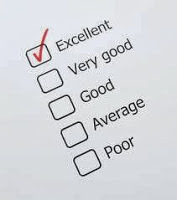 Feedback, by the way, is only valuable if it is constructive. And only by someone who has read your whole book. And you know who will do that. As easily as a manufactured review can be sniffed out for its vague praise and lack of detail, half-hearted feedback will scream at you. The best feedback is honest, insightful, and thoughtful. I always ask the same people to read and provide feedback not because they five-star me every time, but because they don't. I feel it is vital to a writer to have a group of these readers. I am eternally grateful to mine. Without them, I'd still be writing my first book.
Feedback, by the way, is only valuable if it is constructive. And only by someone who has read your whole book. And you know who will do that. As easily as a manufactured review can be sniffed out for its vague praise and lack of detail, half-hearted feedback will scream at you. The best feedback is honest, insightful, and thoughtful. I always ask the same people to read and provide feedback not because they five-star me every time, but because they don't. I feel it is vital to a writer to have a group of these readers. I am eternally grateful to mine. Without them, I'd still be writing my first book.

The story I write may be the most amazing thing I have ever personally read, but that won't mean anything if no one else gets it. And the only way to see if they do get it, is to let my friends, my beta readers, my family members and/or my critique partner read it. And not just once, either. After every revision, every editing session, every time you tearfully strike an entire chapter that was beautiful and melodious but just didn't fit into the story, you need to get your reader's feedback.
Personally speaking, my books go through at least three people before I consider it ready for either my publisher or my editor. I won't lie; it's not easy. But, it isn't always like that. The more I pay attention to feedback, the more likely I am to discover my own "writer issues." I will be even more honest here and tell you a few of mine.
I have an unnnatural attraction to the word "clearly". Seriously, I do. If you have ever edited yourself with the "find" button (another great F-word for editing), I can admit that I use the word clearly more than I use the word looked. Really.I have had to TRAIN myself to not describe the shit out of everything. I have been told by editors who are buckets smarter than I, that the readers want to discover things for themselves, and when I don't give them that chance, I cheat them, then lose them.Lastly, I have had to watch myself with the Golden Rule of Writing: Show, Don't Tell. I suppose that's mainly due to my penchant to try and describe everything to within an inch of its life. I'll follow up with the concept more in my letter "S" post.
 Feedback, by the way, is only valuable if it is constructive. And only by someone who has read your whole book. And you know who will do that. As easily as a manufactured review can be sniffed out for its vague praise and lack of detail, half-hearted feedback will scream at you. The best feedback is honest, insightful, and thoughtful. I always ask the same people to read and provide feedback not because they five-star me every time, but because they don't. I feel it is vital to a writer to have a group of these readers. I am eternally grateful to mine. Without them, I'd still be writing my first book.
Feedback, by the way, is only valuable if it is constructive. And only by someone who has read your whole book. And you know who will do that. As easily as a manufactured review can be sniffed out for its vague praise and lack of detail, half-hearted feedback will scream at you. The best feedback is honest, insightful, and thoughtful. I always ask the same people to read and provide feedback not because they five-star me every time, but because they don't. I feel it is vital to a writer to have a group of these readers. I am eternally grateful to mine. Without them, I'd still be writing my first book.
Published on September 25, 2013 05:00
September 23, 2013
The Writer's Alphabet - E
E is for Editing
 I have written ad nauseum about the importance of editing. You don't leave your house without that final look in the mirror, do you? Same thing with your book. Except, the final look isn't just once. Its about a thousand times. Liken it, if you will, to a diamond. When they find that gem in the mine, it isn't glistening brightly, and perfectly pear-shaped just waiting to be popped onto that dazzling ring display. Rather, the diamond starts its life as a rock. It is only the constant buffing, and precision shaping and defining that really lets it shine.
I have written ad nauseum about the importance of editing. You don't leave your house without that final look in the mirror, do you? Same thing with your book. Except, the final look isn't just once. Its about a thousand times. Liken it, if you will, to a diamond. When they find that gem in the mine, it isn't glistening brightly, and perfectly pear-shaped just waiting to be popped onto that dazzling ring display. Rather, the diamond starts its life as a rock. It is only the constant buffing, and precision shaping and defining that really lets it shine.
Your precious story is just like that. Without the editing, it would still be that rock. Truckloads of potential, but nothing without the polisher. Your editor is your polisher. He or she has a wealth of experience and knows the industry, which changes all the time, so that is no small feat. Let them guide you. And before you know it, your little gem will become the diamond it was always destined to be.
 I have written ad nauseum about the importance of editing. You don't leave your house without that final look in the mirror, do you? Same thing with your book. Except, the final look isn't just once. Its about a thousand times. Liken it, if you will, to a diamond. When they find that gem in the mine, it isn't glistening brightly, and perfectly pear-shaped just waiting to be popped onto that dazzling ring display. Rather, the diamond starts its life as a rock. It is only the constant buffing, and precision shaping and defining that really lets it shine.
I have written ad nauseum about the importance of editing. You don't leave your house without that final look in the mirror, do you? Same thing with your book. Except, the final look isn't just once. Its about a thousand times. Liken it, if you will, to a diamond. When they find that gem in the mine, it isn't glistening brightly, and perfectly pear-shaped just waiting to be popped onto that dazzling ring display. Rather, the diamond starts its life as a rock. It is only the constant buffing, and precision shaping and defining that really lets it shine.Your precious story is just like that. Without the editing, it would still be that rock. Truckloads of potential, but nothing without the polisher. Your editor is your polisher. He or she has a wealth of experience and knows the industry, which changes all the time, so that is no small feat. Let them guide you. And before you know it, your little gem will become the diamond it was always destined to be.
Published on September 23, 2013 05:00
September 22, 2013
The Writer's Alphabet - D
D is for DMCA Take-Down Notice
DMCA stands for Digital Millenium Copyright Act. This piece of legislature covers all art in it's original format and protects it's author from theft. That means just like a song, a story can be stolen. Remember Napster, the file-sharing website that got shut down? They were in violation of the DMCA. And the music industry roared and they disappeared.
Unfortunately, story pirates abound on the internet. Which sucks. You write a story, a damn good story, and your publisher turns it into an ebook, making it digitally available on the world-wide web. Its the worldwide part that will kill you. Because some asshat in Bangladesh or Czechoslovakia will buy one copy of your book, then download it illegally on their site. They will then make it available to a shit-ton of other asshats, who will download it themselves and soon, your book has been downloaded sixteen thousand times and you will never see a penny of the royalty because there wasn't one dime paid of it. Asshats.

So, the following is a very important document for you. It is called the DMCA Take-Down Notice and it should be sent to every pirate site you find sharing your books. Under federal law, they then have to remove your book from their site. I have used this notice, or a version of it, and have even received responses with the asshats apologizing for posting my work without permission. Not one has ever ignored me. So far, anyway. Use this in good health, my writer friends.
SAMPLE DMCA TAKE DOWN NOTICE
My name is INSERT NAME and I am the INSERT TITLE of INSERT COMPANY NAME. A website that your company hosts (according to WHOIS information) is infringing on at least one copyright owned by me or my company.The unauthorized and infringing copy can be found at:PROVIDE WEBSITE URLThis letter is official notification under Section 512(c) of the Digital Millennium Copyright Act (”DMCA”), and I seek the removal of the aforementioned infringing material from your servers. I request that you immediately notify the infringer of this notice and inform them of their duty to remove the infringing material immediately, and notify them to cease any further posting of infringing material to your server in the future.Please also be advised that law requires you, as a service provider, to remove or disable access to the infringing materials upon receiving this notice. Under US law a service provider, such as yourself, enjoys immunity from a copyright lawsuit provided that you act with deliberate speed to investigate and rectify ongoing copyright infringement. If service providers do not investigate and remove or disable the infringing material this immunity is lost. Therefore, in order for you to remain immune from a copyright infringement action you will need to investigate and ultimately remove or otherwise disable the infringing material from your servers with all due speed should the direct infringer, your client, not comply immediately.I am providing this notice in good faith and with the reasonable belief that rights me or my company owns are being infringed. Under penalty of perjury I certify that the information contained in the notification is both true and accurate, and I have the authority to act as the owner of the copyright(s) involved.Should you wish to discuss this with me please contact me directly.Thank you.s/YOUR NAMEE-mail
DMCA stands for Digital Millenium Copyright Act. This piece of legislature covers all art in it's original format and protects it's author from theft. That means just like a song, a story can be stolen. Remember Napster, the file-sharing website that got shut down? They were in violation of the DMCA. And the music industry roared and they disappeared.
Unfortunately, story pirates abound on the internet. Which sucks. You write a story, a damn good story, and your publisher turns it into an ebook, making it digitally available on the world-wide web. Its the worldwide part that will kill you. Because some asshat in Bangladesh or Czechoslovakia will buy one copy of your book, then download it illegally on their site. They will then make it available to a shit-ton of other asshats, who will download it themselves and soon, your book has been downloaded sixteen thousand times and you will never see a penny of the royalty because there wasn't one dime paid of it. Asshats.

So, the following is a very important document for you. It is called the DMCA Take-Down Notice and it should be sent to every pirate site you find sharing your books. Under federal law, they then have to remove your book from their site. I have used this notice, or a version of it, and have even received responses with the asshats apologizing for posting my work without permission. Not one has ever ignored me. So far, anyway. Use this in good health, my writer friends.
SAMPLE DMCA TAKE DOWN NOTICE
My name is INSERT NAME and I am the INSERT TITLE of INSERT COMPANY NAME. A website that your company hosts (according to WHOIS information) is infringing on at least one copyright owned by me or my company.The unauthorized and infringing copy can be found at:PROVIDE WEBSITE URLThis letter is official notification under Section 512(c) of the Digital Millennium Copyright Act (”DMCA”), and I seek the removal of the aforementioned infringing material from your servers. I request that you immediately notify the infringer of this notice and inform them of their duty to remove the infringing material immediately, and notify them to cease any further posting of infringing material to your server in the future.Please also be advised that law requires you, as a service provider, to remove or disable access to the infringing materials upon receiving this notice. Under US law a service provider, such as yourself, enjoys immunity from a copyright lawsuit provided that you act with deliberate speed to investigate and rectify ongoing copyright infringement. If service providers do not investigate and remove or disable the infringing material this immunity is lost. Therefore, in order for you to remain immune from a copyright infringement action you will need to investigate and ultimately remove or otherwise disable the infringing material from your servers with all due speed should the direct infringer, your client, not comply immediately.I am providing this notice in good faith and with the reasonable belief that rights me or my company owns are being infringed. Under penalty of perjury I certify that the information contained in the notification is both true and accurate, and I have the authority to act as the owner of the copyright(s) involved.Should you wish to discuss this with me please contact me directly.Thank you.s/YOUR NAMEE-mail
Published on September 22, 2013 05:00
September 19, 2013
The Writer's Alphabet - C
C is for Covers
Of course, you have heard this term before. But, did you know that a good cover can be the reason a book is successful, and a bad cover can be the reason it bombs? The best example I can think of isn't even a book. It's an album cover. Remember The Beatles White album? It was the perfect cover because of what it DIDN'T say. Your book should be the same way.
I am lucky to collaborate with some exceptional artists and graphic designers when my books are ready for life. A good artist will give that life to your vision. I put down my concept on paper, and they make it breathe.
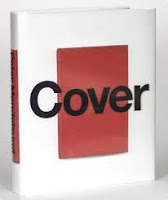
Another fun fact: when given the opportunity, 83% of people choose a cover that does one of three things, 1) entices them with color, 2) entices them with what it doesn't say, and 3) teases with a question. I, myself, am partial to color. If you have seen ANY of my covers, you'll already know that.
The one thing I can say about covers, is that there is no exact science. As an author, you should make sure your cover conveys what you want it to, regardless if you publish with the Big Five, or you go the indie route, or you even self-publish. Just make sure you love it. Then, your readers will, too.
Of course, you have heard this term before. But, did you know that a good cover can be the reason a book is successful, and a bad cover can be the reason it bombs? The best example I can think of isn't even a book. It's an album cover. Remember The Beatles White album? It was the perfect cover because of what it DIDN'T say. Your book should be the same way.
I am lucky to collaborate with some exceptional artists and graphic designers when my books are ready for life. A good artist will give that life to your vision. I put down my concept on paper, and they make it breathe.

Another fun fact: when given the opportunity, 83% of people choose a cover that does one of three things, 1) entices them with color, 2) entices them with what it doesn't say, and 3) teases with a question. I, myself, am partial to color. If you have seen ANY of my covers, you'll already know that.
The one thing I can say about covers, is that there is no exact science. As an author, you should make sure your cover conveys what you want it to, regardless if you publish with the Big Five, or you go the indie route, or you even self-publish. Just make sure you love it. Then, your readers will, too.
Published on September 19, 2013 05:00
September 17, 2013
The Writer's Alphabet - B
B is for Back story
Back story is an interesting concept. You both want it and don't want it. Also, when you want it, you have to be careful how you dole it out. See? Confusing, right? Okay, here is the deal: Back story is the part of your character's life that you don't spell out; you only allude to it throughout your novel. But, in snippets. Too much is too much and too little isn't enough. Let me explain.

Say your character is sad. Simple, I know, but stay with me. You don't say "Sarah was sad because her husband was late coming home from work again." You start by dropping a hint about her childhood. About her memories of her own father coming home late from work. And the eventual discovery of the affair. And how it nearly killed her mother. Etc, etc. etc. You mention how it makes her feel twelve years old again. Maybe you have her wonder aloud if her own daughter now feels as she did. Voila! Back story. In a few short sentences you dragging in some drama from the past and stirred it all up with some drama for the future and you didn't bore your reader because it happened so fast they never saw the set-up coming. Back story.
The biggest thing to remember with back story is to sprinkle it in the story the same way you season food. A little goes a long way. And never underestimate your reader. He/she is smart. They will figure out the subtle nuance of what you are saying as easily as the unspoken drama of what you are NOT saying. But, don't force-feed them. You will get far more respect from your readers if you let them figure it out for themselves.
Think of a conversation you might have with a person who is new to you. You don't blab all over them about your divorce, your incontinence, your father's cancer, your grandmother's dementia, and that itty bitty gambling problem you have that you are sure you've got licked. You let out teeny chunks of your life in the conversation when appropriate. Do the same thing in your story.
Back story is an interesting concept. You both want it and don't want it. Also, when you want it, you have to be careful how you dole it out. See? Confusing, right? Okay, here is the deal: Back story is the part of your character's life that you don't spell out; you only allude to it throughout your novel. But, in snippets. Too much is too much and too little isn't enough. Let me explain.

Say your character is sad. Simple, I know, but stay with me. You don't say "Sarah was sad because her husband was late coming home from work again." You start by dropping a hint about her childhood. About her memories of her own father coming home late from work. And the eventual discovery of the affair. And how it nearly killed her mother. Etc, etc. etc. You mention how it makes her feel twelve years old again. Maybe you have her wonder aloud if her own daughter now feels as she did. Voila! Back story. In a few short sentences you dragging in some drama from the past and stirred it all up with some drama for the future and you didn't bore your reader because it happened so fast they never saw the set-up coming. Back story.
The biggest thing to remember with back story is to sprinkle it in the story the same way you season food. A little goes a long way. And never underestimate your reader. He/she is smart. They will figure out the subtle nuance of what you are saying as easily as the unspoken drama of what you are NOT saying. But, don't force-feed them. You will get far more respect from your readers if you let them figure it out for themselves.
Think of a conversation you might have with a person who is new to you. You don't blab all over them about your divorce, your incontinence, your father's cancer, your grandmother's dementia, and that itty bitty gambling problem you have that you are sure you've got licked. You let out teeny chunks of your life in the conversation when appropriate. Do the same thing in your story.
Published on September 17, 2013 05:00
September 15, 2013
The Writer's Alphabet - A
This is a new series of posts I am doing on the bloggy, regarding the various terms and definitions of author/writer/publishing words. One post per letter. Some posts may have more than one word, and some only one. I am sure I will forget some; doubly sure I will be advised in some fashion that I did. Anywho, enjoy all 26 letters!
When I was just starting out, had finished my first book and was researching the internet to see how this whole publishing thing works, I became aware very quickly that there is an entire other language with words and phrases I had never heard spoken outside the confines of this industry. As is my way, I started keeping a list of all the words I was learning. I am a SERIOUS list-maker. I came across my list recently and thought it might help some of my bloggy-buddies out. Hope so. Here we go!
"A" is for Agent
A literary agent is the person who agrees to represent you, and your book, for a fee. In return for 15% of your net proceeds, (a small price, if you ask me), the agent will shop your book to buying publishers, assist you in the marketing of said book, and, depending on the volume of sales of the book, create marketing opportunities for you. But, there's more. Oh, an agent will do so much more. They will hone your pitch to within an inch of its life. They will edit, or assign you an editor who will make your book sing, where before it merely hummed loudly. They will offer you their invaluable opinion on everything from the title, to the cover art, to the inside book flap blurb. And mostly, they will hold your hand, tell you the truth about your book when no one else will, and be right there next to you as you transition from scared newbie to seasoned professional.
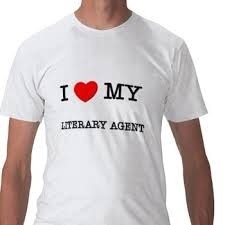
You don't need an agent, but if you are interested in NOT doing all your own marketing, NOT having a friend in your corner, and NOT having an experienced person championing your work to the exact right place, then don't try and find one. If you are interested in all that, and just think it would be neat to hear someone say "I get where you are going with this." then by all means, look for one.
When I was just starting out, had finished my first book and was researching the internet to see how this whole publishing thing works, I became aware very quickly that there is an entire other language with words and phrases I had never heard spoken outside the confines of this industry. As is my way, I started keeping a list of all the words I was learning. I am a SERIOUS list-maker. I came across my list recently and thought it might help some of my bloggy-buddies out. Hope so. Here we go!
"A" is for Agent
A literary agent is the person who agrees to represent you, and your book, for a fee. In return for 15% of your net proceeds, (a small price, if you ask me), the agent will shop your book to buying publishers, assist you in the marketing of said book, and, depending on the volume of sales of the book, create marketing opportunities for you. But, there's more. Oh, an agent will do so much more. They will hone your pitch to within an inch of its life. They will edit, or assign you an editor who will make your book sing, where before it merely hummed loudly. They will offer you their invaluable opinion on everything from the title, to the cover art, to the inside book flap blurb. And mostly, they will hold your hand, tell you the truth about your book when no one else will, and be right there next to you as you transition from scared newbie to seasoned professional.

You don't need an agent, but if you are interested in NOT doing all your own marketing, NOT having a friend in your corner, and NOT having an experienced person championing your work to the exact right place, then don't try and find one. If you are interested in all that, and just think it would be neat to hear someone say "I get where you are going with this." then by all means, look for one.
Published on September 15, 2013 22:26
September 8, 2013
The Seven Biggest Mistakes Writers Make
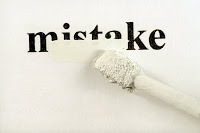 Scary title, huh? But, it's true. As I have learned. Being a writer/published author in the most digital age the publishing industry has ever seen, I have done my fair share of research on the subject of What Agents Want.
Scary title, huh? But, it's true. As I have learned. Being a writer/published author in the most digital age the publishing industry has ever seen, I have done my fair share of research on the subject of What Agents Want.Of course, as I continue to publish independently, it is all too clear that I may have not yet reached that holy grail. That won't stop me from helping you, however. And since my books are consistently accepted by publishers in the independent world, I must be doing something right.
So, at the risk of sounding nerdy and too know-it-all, I want to give you my take on the seven biggest mistakes we authors make when we are writing our babies.
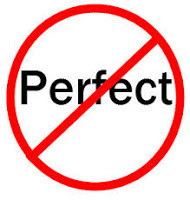 We make everything in our book sound like fantasyland, even when we are not writing a fantasy. Let me explain. There may be men in the world who always wash the dishes when they finish a meal, who always put the lid down, and who always know just the most perfect thing to say when their loved ones feel fat/unhappy/unfulfilled, etc. There may be, but I personally have never met one. Therefore, I have no business writing one. Perfect people piss me off. I can wrap my head around a flaw, people. I can relate to it. I can understand it. And if I can do those things, I will love the character who has them. Remember, perfect pisses people off.We make happy endings out of everything. Okay, that pisses me off, too. I don't want the guy to always get the girl. I don't want the girl to always choose the right guy. I am far more interested in reading about the misfit who goes her own way, the guy who marches to his own beat, and the villain even, that goes against type. Those people lead more interesting lives and are far more fun to learn about. As writers, we are charged with creating complex, layered characters. I liken it to the seven-layer dip. You know the one? You chow through the beans to find the meat. You rip through the meat and find guacamole. Which then unveils the cheese. Each layer is more exciting that the previous because you couldn't guess what was there. Peeling layers away from your character makes the reader love them even more.We cliche our characters. You know....the Prostitute With a Heart of Gold. The Mean Boss. The Uncaring Stepmother. The Absentee Father. I'm not saying you can't use these themes for your protag or antag. I am saying you have to make them interesting. Does the prostitute secretly send her money to an autistic brother? Is the mean boss putting up guards because his wife is dying of cancer? Is the absentee father harboring a secret, second family? Make it interesting, people. Make me want to read it.We bore you to death with insincere dialogue. If you are writing Middle Grade, you damn well better have spent a decent portion of time at an elementary school at lunch or your readers will call you out. If you are writing about doctors, you better have spent a fair amount of research at hospitals, clinics, or even elevators. I know a writer who rides elevators at courthouses to get a flavor of the expertise of the professionals and the anguish of loved ones. (Maybe those two examples are me. Not saying. Whatever. Move on.)We paint scenes like a travel writer. Those flowery phrases describing the lush, tropical climate, or the austere presence of a brick government building, or the sounds the water makes lapping at the shore do have a place, but not in the opening of your story. Describing anything there is a no-no. With one exception. You need to be inside your character's head and you need to invite your reader to get in there with you. If you don't, your protag or antag will always be one dimensional to your reader. And they won't be a reader for long. They aren't interested in the length of the grass; they want to know about the kid cutting it. Period. Save the lovely scene-making for Sunset Magazine.We forget the tension. Say what you will about Stephenie Meyers. I have said it before and will say it again: the woman gives good tension. Every page of those books are fraught with danger and teenage angst. As a writer, you have to make your action scenes almost life-threatening. At least to your characters. Because in real life, they are. If you are writing YA, you know that everything is life or death to a teen. I remember wailing uncontrollably in my teens because my mum had sewn the hem of my Salt-of-the-Earth jeans too high. It was unthinkable! High-waters! I would have been laughed out of the quad and the whole school year would have been ruined. I may as well have moved to a convent; no boy would ever speak to me again. Remember that? Good. Now, write like that.We think if we get bored with our own material, no one will notice. Wrong. Wrong, wrong, wrong, wrong, and wrong. If we lose the passion for our work, so will the reader. No passion will equal no tension, which will mean your reader will no longer care about what happens to your protag. And as writers, that is really the only job we have: we have to make our readers care about our characters. This neatly ties in with the other mistakes we make. We forget to layer our characters, make them realistic, make them talk like real people, and forget to put them in crazy situations. Because life is crazy. It is not smooth, or predictable, or even seamless. It is choppy, and unexpected, and wonderful and weird. Make your characters lives that way and your readers will be unable to put the book down. And when they do, they will crave more from you. See, your only job. Easy, right?
We make everything in our book sound like fantasyland, even when we are not writing a fantasy. Let me explain. There may be men in the world who always wash the dishes when they finish a meal, who always put the lid down, and who always know just the most perfect thing to say when their loved ones feel fat/unhappy/unfulfilled, etc. There may be, but I personally have never met one. Therefore, I have no business writing one. Perfect people piss me off. I can wrap my head around a flaw, people. I can relate to it. I can understand it. And if I can do those things, I will love the character who has them. Remember, perfect pisses people off.We make happy endings out of everything. Okay, that pisses me off, too. I don't want the guy to always get the girl. I don't want the girl to always choose the right guy. I am far more interested in reading about the misfit who goes her own way, the guy who marches to his own beat, and the villain even, that goes against type. Those people lead more interesting lives and are far more fun to learn about. As writers, we are charged with creating complex, layered characters. I liken it to the seven-layer dip. You know the one? You chow through the beans to find the meat. You rip through the meat and find guacamole. Which then unveils the cheese. Each layer is more exciting that the previous because you couldn't guess what was there. Peeling layers away from your character makes the reader love them even more.We cliche our characters. You know....the Prostitute With a Heart of Gold. The Mean Boss. The Uncaring Stepmother. The Absentee Father. I'm not saying you can't use these themes for your protag or antag. I am saying you have to make them interesting. Does the prostitute secretly send her money to an autistic brother? Is the mean boss putting up guards because his wife is dying of cancer? Is the absentee father harboring a secret, second family? Make it interesting, people. Make me want to read it.We bore you to death with insincere dialogue. If you are writing Middle Grade, you damn well better have spent a decent portion of time at an elementary school at lunch or your readers will call you out. If you are writing about doctors, you better have spent a fair amount of research at hospitals, clinics, or even elevators. I know a writer who rides elevators at courthouses to get a flavor of the expertise of the professionals and the anguish of loved ones. (Maybe those two examples are me. Not saying. Whatever. Move on.)We paint scenes like a travel writer. Those flowery phrases describing the lush, tropical climate, or the austere presence of a brick government building, or the sounds the water makes lapping at the shore do have a place, but not in the opening of your story. Describing anything there is a no-no. With one exception. You need to be inside your character's head and you need to invite your reader to get in there with you. If you don't, your protag or antag will always be one dimensional to your reader. And they won't be a reader for long. They aren't interested in the length of the grass; they want to know about the kid cutting it. Period. Save the lovely scene-making for Sunset Magazine.We forget the tension. Say what you will about Stephenie Meyers. I have said it before and will say it again: the woman gives good tension. Every page of those books are fraught with danger and teenage angst. As a writer, you have to make your action scenes almost life-threatening. At least to your characters. Because in real life, they are. If you are writing YA, you know that everything is life or death to a teen. I remember wailing uncontrollably in my teens because my mum had sewn the hem of my Salt-of-the-Earth jeans too high. It was unthinkable! High-waters! I would have been laughed out of the quad and the whole school year would have been ruined. I may as well have moved to a convent; no boy would ever speak to me again. Remember that? Good. Now, write like that.We think if we get bored with our own material, no one will notice. Wrong. Wrong, wrong, wrong, wrong, and wrong. If we lose the passion for our work, so will the reader. No passion will equal no tension, which will mean your reader will no longer care about what happens to your protag. And as writers, that is really the only job we have: we have to make our readers care about our characters. This neatly ties in with the other mistakes we make. We forget to layer our characters, make them realistic, make them talk like real people, and forget to put them in crazy situations. Because life is crazy. It is not smooth, or predictable, or even seamless. It is choppy, and unexpected, and wonderful and weird. Make your characters lives that way and your readers will be unable to put the book down. And when they do, they will crave more from you. See, your only job. Easy, right?
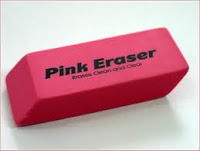 So, in closing, I want to reiterate this: your reader only expects two things from your book. Sure, they want it to entertain them, that's a given. But, they also want to connect with your characters and by extension, you. Make yours believable. Read their dialogue out loud. if it sounds stiff, it probably is. Chop it down. Make them face life-threatening and life-affirming decisions. Because we do, everyday. We'll relate to them better. And give them flaws. Flaws are interesting. They add character, depth, layers. Make me want to meet your characters in real life, and you will have me reading your books for all of mine.
So, in closing, I want to reiterate this: your reader only expects two things from your book. Sure, they want it to entertain them, that's a given. But, they also want to connect with your characters and by extension, you. Make yours believable. Read their dialogue out loud. if it sounds stiff, it probably is. Chop it down. Make them face life-threatening and life-affirming decisions. Because we do, everyday. We'll relate to them better. And give them flaws. Flaws are interesting. They add character, depth, layers. Make me want to meet your characters in real life, and you will have me reading your books for all of mine.
Published on September 08, 2013 14:33
September 5, 2013
What Writers Can Learn From Miley Cyrus
We all saw the Hannah-Montana-Is-All-Grown-Up-Now show at the Video Music Awards a couple weeks ago. Twitter and Facebook fairly imploded during, after, and way, way after the show with everyone from Lady Gaga to my own Mum registering an opinion and weighing in with what could have caused Miley's nasty about-face from her previously wholesome image. Frankly, I found far more value in the act. I proudly unveil the following:
THINGS WRITERS CAN LEARN FROM ALL-GROWN-UP MILEY CYRUS.
Know Your Audience - Miley may have thought that showing the world how much she had matured would be the best way to segue into more adult material. Maybe, but she forgot one salient point: PARENTS buy their teen's music because largely, teens have no money. In her haste, Miley forgot the golden rule of salesmanship. Appeal always to the one with the cash. That HAS to be the reason there is a glut of bodice-ripping romance novels out there.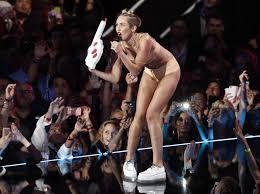 Because readers are BUYING them.Too Much is Sometimes Just...Too Much - with all the freaky dancing teddy bears and obscene foam fingers being used in a manner I holler at my ten year old for, the song got lost. This is a great lesson for writers. Edit, edit, edit. Let the original idea shine and dump all the hoopla. If you bury the lead, the story will not sing.Shock for Shock Value Has No Staying Power - Sure, the performance was new and different for the Miley we have seen before. The problem is, it wasn't new to the music world. On the same show, Lady Gaga whips it down to a g-string BEFORE Miley performed. And at the risk of aging myself, Madonna did it better WAY before anyone else, and she did it like a virgin. Ahem. As a writer, we should remember this as well. If you are rehashing an old idea, you better make it fresh, or your fans will call you out for lack of originality at best, and straight-out copying at worst. BE ORIGINAL. Unless you are writing fan-fic. For this, I have no advice at all.Sex for Sex' Sake is Boring - Miley tried to jam sexuality down our throats and if you believe all the hot debates, we gagged. The same goes for gratuitous sex in our writing. Certainly, a steamy scene has its place, but unless you are writing porn, it will feel out of place crammed into every other scene in your book. Entice your reader with intrigue, passion, and anticipation, not tired sex scenes.Practice, Practice, Practice - one thing was glaringly obvious to me watching her performance: she was unrehearsed. Most of her "dancing" was ad-libbed and even I could tell she was missing marks and confusing the dancers around her. It reminded me of that shabby performance Britney gave us where she mainly phoned it in. Miley made up for some of it with her energy and antics, but clearly she hadn't put in the time. As writers, every story we write is practice. No one expects to be a best-seller right out of the gate. Okay, everyone does, but we know it never happens. You have to put in the time. You have to hone your craft. You have to develop your talent. Don't ever be accused of just phoning it in.If you saw the show and want to add anything, I'd love to hear about it. What did her performance teach you, as a writer?
Because readers are BUYING them.Too Much is Sometimes Just...Too Much - with all the freaky dancing teddy bears and obscene foam fingers being used in a manner I holler at my ten year old for, the song got lost. This is a great lesson for writers. Edit, edit, edit. Let the original idea shine and dump all the hoopla. If you bury the lead, the story will not sing.Shock for Shock Value Has No Staying Power - Sure, the performance was new and different for the Miley we have seen before. The problem is, it wasn't new to the music world. On the same show, Lady Gaga whips it down to a g-string BEFORE Miley performed. And at the risk of aging myself, Madonna did it better WAY before anyone else, and she did it like a virgin. Ahem. As a writer, we should remember this as well. If you are rehashing an old idea, you better make it fresh, or your fans will call you out for lack of originality at best, and straight-out copying at worst. BE ORIGINAL. Unless you are writing fan-fic. For this, I have no advice at all.Sex for Sex' Sake is Boring - Miley tried to jam sexuality down our throats and if you believe all the hot debates, we gagged. The same goes for gratuitous sex in our writing. Certainly, a steamy scene has its place, but unless you are writing porn, it will feel out of place crammed into every other scene in your book. Entice your reader with intrigue, passion, and anticipation, not tired sex scenes.Practice, Practice, Practice - one thing was glaringly obvious to me watching her performance: she was unrehearsed. Most of her "dancing" was ad-libbed and even I could tell she was missing marks and confusing the dancers around her. It reminded me of that shabby performance Britney gave us where she mainly phoned it in. Miley made up for some of it with her energy and antics, but clearly she hadn't put in the time. As writers, every story we write is practice. No one expects to be a best-seller right out of the gate. Okay, everyone does, but we know it never happens. You have to put in the time. You have to hone your craft. You have to develop your talent. Don't ever be accused of just phoning it in.If you saw the show and want to add anything, I'd love to hear about it. What did her performance teach you, as a writer?
THINGS WRITERS CAN LEARN FROM ALL-GROWN-UP MILEY CYRUS.
Know Your Audience - Miley may have thought that showing the world how much she had matured would be the best way to segue into more adult material. Maybe, but she forgot one salient point: PARENTS buy their teen's music because largely, teens have no money. In her haste, Miley forgot the golden rule of salesmanship. Appeal always to the one with the cash. That HAS to be the reason there is a glut of bodice-ripping romance novels out there.
 Because readers are BUYING them.Too Much is Sometimes Just...Too Much - with all the freaky dancing teddy bears and obscene foam fingers being used in a manner I holler at my ten year old for, the song got lost. This is a great lesson for writers. Edit, edit, edit. Let the original idea shine and dump all the hoopla. If you bury the lead, the story will not sing.Shock for Shock Value Has No Staying Power - Sure, the performance was new and different for the Miley we have seen before. The problem is, it wasn't new to the music world. On the same show, Lady Gaga whips it down to a g-string BEFORE Miley performed. And at the risk of aging myself, Madonna did it better WAY before anyone else, and she did it like a virgin. Ahem. As a writer, we should remember this as well. If you are rehashing an old idea, you better make it fresh, or your fans will call you out for lack of originality at best, and straight-out copying at worst. BE ORIGINAL. Unless you are writing fan-fic. For this, I have no advice at all.Sex for Sex' Sake is Boring - Miley tried to jam sexuality down our throats and if you believe all the hot debates, we gagged. The same goes for gratuitous sex in our writing. Certainly, a steamy scene has its place, but unless you are writing porn, it will feel out of place crammed into every other scene in your book. Entice your reader with intrigue, passion, and anticipation, not tired sex scenes.Practice, Practice, Practice - one thing was glaringly obvious to me watching her performance: she was unrehearsed. Most of her "dancing" was ad-libbed and even I could tell she was missing marks and confusing the dancers around her. It reminded me of that shabby performance Britney gave us where she mainly phoned it in. Miley made up for some of it with her energy and antics, but clearly she hadn't put in the time. As writers, every story we write is practice. No one expects to be a best-seller right out of the gate. Okay, everyone does, but we know it never happens. You have to put in the time. You have to hone your craft. You have to develop your talent. Don't ever be accused of just phoning it in.If you saw the show and want to add anything, I'd love to hear about it. What did her performance teach you, as a writer?
Because readers are BUYING them.Too Much is Sometimes Just...Too Much - with all the freaky dancing teddy bears and obscene foam fingers being used in a manner I holler at my ten year old for, the song got lost. This is a great lesson for writers. Edit, edit, edit. Let the original idea shine and dump all the hoopla. If you bury the lead, the story will not sing.Shock for Shock Value Has No Staying Power - Sure, the performance was new and different for the Miley we have seen before. The problem is, it wasn't new to the music world. On the same show, Lady Gaga whips it down to a g-string BEFORE Miley performed. And at the risk of aging myself, Madonna did it better WAY before anyone else, and she did it like a virgin. Ahem. As a writer, we should remember this as well. If you are rehashing an old idea, you better make it fresh, or your fans will call you out for lack of originality at best, and straight-out copying at worst. BE ORIGINAL. Unless you are writing fan-fic. For this, I have no advice at all.Sex for Sex' Sake is Boring - Miley tried to jam sexuality down our throats and if you believe all the hot debates, we gagged. The same goes for gratuitous sex in our writing. Certainly, a steamy scene has its place, but unless you are writing porn, it will feel out of place crammed into every other scene in your book. Entice your reader with intrigue, passion, and anticipation, not tired sex scenes.Practice, Practice, Practice - one thing was glaringly obvious to me watching her performance: she was unrehearsed. Most of her "dancing" was ad-libbed and even I could tell she was missing marks and confusing the dancers around her. It reminded me of that shabby performance Britney gave us where she mainly phoned it in. Miley made up for some of it with her energy and antics, but clearly she hadn't put in the time. As writers, every story we write is practice. No one expects to be a best-seller right out of the gate. Okay, everyone does, but we know it never happens. You have to put in the time. You have to hone your craft. You have to develop your talent. Don't ever be accused of just phoning it in.If you saw the show and want to add anything, I'd love to hear about it. What did her performance teach you, as a writer?
Published on September 05, 2013 23:42



